二年级英语阅读材料
适合小学二年级学生的英语阅读三篇
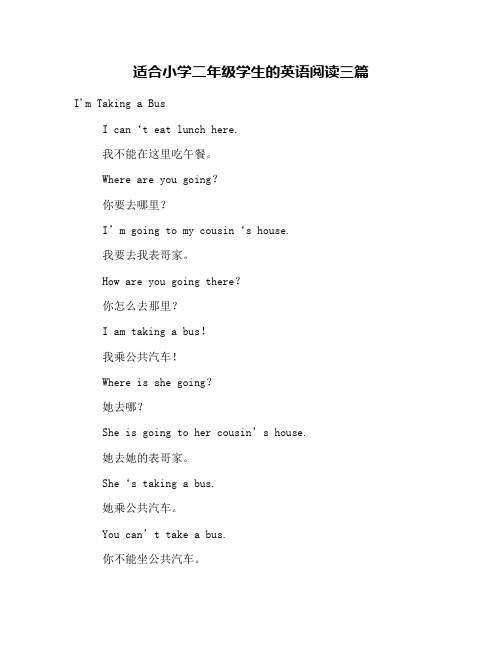
适合小学二年级学生的英语阅读三篇I'm Taking a BusI can‘t eat lunch here.我不能在这里吃午餐。
Where are you going?你要去哪里?I’m going to my cousin‘s house.我要去我表哥家。
How are you going there?你怎么去那里?I am taking a bus!我乘公共汽车!Where is she going?她去哪?She is going to her cousin’s house.她去她的表哥家。
She‘s taking a bus.她乘公共汽车。
You can’t take a bus.你不能坐公共汽车。
Hmmmph!Then I‘m walking.呃呃!那我走路。
Maxie! Be careful, Maxie!马克西!要小心,马克西!Oh, pee-yew! Skunks!哦,撒尿-红豆杉!臭鼬!Run, run as fast as you can!跑,尽你所能快跑!Otis and Olive,奥蒂斯和奥利芙,thank you so much.非常感谢你们。
【篇二】We Ate NoodlesMaxie! Taco! Where were you yesterday?马克西!塔可!你们昨天在哪儿?Yesterday we were at the park.我们昨天在公园里。
What did you do?你们做了什么?We ate lunch with skunks.我们和臭鼬一起吃午餐。
What did you eat?你吃了什么?We ate noodles.我们吃了面条。
What did you drink?那你喝什么?We drank juice.我们喝了果汁。
What did you do yesterday, Heddy?你昨天做了什么,海蒂?I saw a reporter.我看到了一个记者。
适合小学二年级阅读的经典英语短文
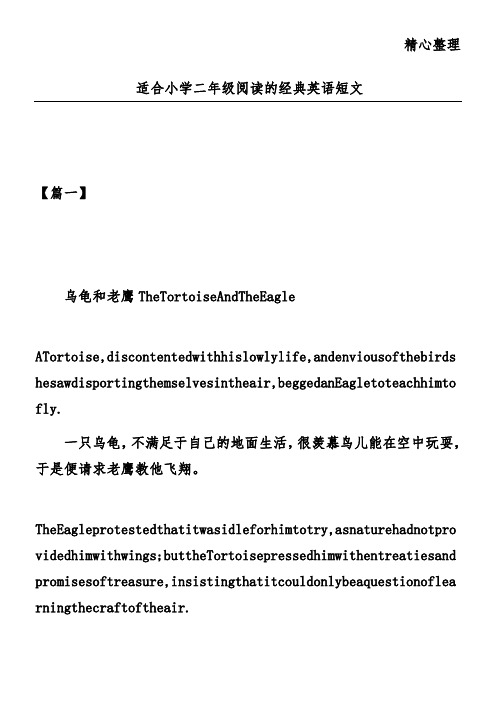
精心整理适合小学二年级阅读的经典英语短文TheEagleprotestedthatitwasidleforhimtotry,asnaturehadnotpro videdhimwithwings;buttheTortoisepressedhimwithentreatiesand promisesoftreasure,insistingthatitcouldonlybeaquestionoflea rningthecraftoftheair.老鹰劝她,这是他的一个白日梦,因为大自然并没有赋予他可以飞翔的翅膀。
可是乌龟再三恳求,还用珍宝利诱老鹰,一再坚持这只是一个了解如何在空中飞翔的问题。
骨。
鹰与捕鹰者TheEagleandhisCaptorAManoncecaughtanEagle,andafterclippinghiswingsturnedhimloos eamongthefowlsinhishen-house,wherehemopedinacorner,lookingverydejectedandforlorn.AfterawhilehisCaptorwasgladenoughtose llhimtoaneighbour,whotookhimhomeandlethiswingsgrowagain.Ass oonashehadrecoveredtheuseofthem,theEagleflewoutandcaughtaha re,whichhebroughthomeandpresentedtohisbenefactor.Afoxobserv edthis,andsaidtotheEagle,“Don’twasteyourgiftsonhim!Goandg【篇三】小女孩的梦想AlittleGirl’sDreamThepromisewasalongtimekeeping.Butthen,sowasthedream.这个诺言被长久地遵守着,而这个梦想也同样如此。
二年级英语 外研社 课外阅读材料
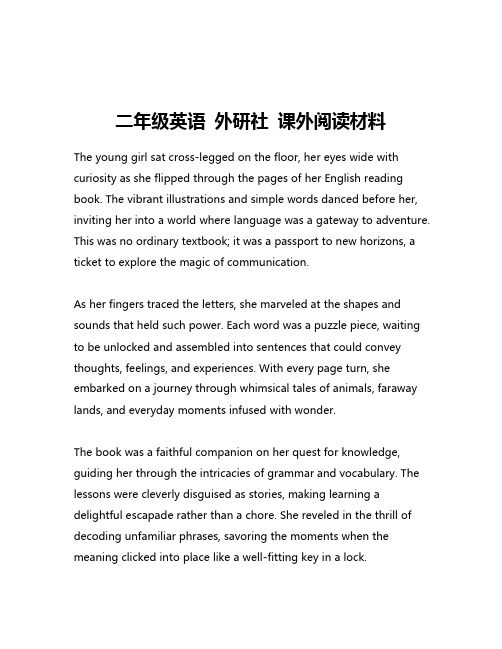
二年级英语外研社课外阅读材料The young girl sat cross-legged on the floor, her eyes wide with curiosity as she flipped through the pages of her English reading book. The vibrant illustrations and simple words danced before her, inviting her into a world where language was a gateway to adventure. This was no ordinary textbook; it was a passport to new horizons, a ticket to explore the magic of communication.As her fingers traced the letters, she marveled at the shapes and sounds that held such power. Each word was a puzzle piece, waiting to be unlocked and assembled into sentences that could convey thoughts, feelings, and experiences. With every page turn, she embarked on a journey through whimsical tales of animals, faraway lands, and everyday moments infused with wonder.The book was a faithful companion on her quest for knowledge, guiding her through the intricacies of grammar and vocabulary. The lessons were cleverly disguised as stories, making learning a delightful escapade rather than a chore. She reveled in the thrill of decoding unfamiliar phrases, savoring the moments when the meaning clicked into place like a well-fitting key in a lock.But the joy extended far beyond mere comprehension. The book introduced her to a wealth of cultures, traditions, and perspectives that broadened her horizons. Through the eyes of fictional characters, she traveled to distant corners of the world, experiencing the richness of diversity without ever leaving the comfort of her cozy reading nook.Each time she cracked open the book, she embarked on a new adventure, eagerly anticipating the surprises that awaited her. The stories transported her to realms where animals talked, where ordinary objects sprang to life, and where the very fabric of reality was woven with the threads of imagination. In these enchanting narratives, she learned that language was not merely a tool for communication but a canvas upon which dreams and fantasies could be painted.As she progressed through the book, her confidence grew, and her command of the English language blossomed like a vibrant flower. The once-daunting words became familiar friends, and the intricate sentence structures unraveled like intricate tapestries, revealing their hidden patterns and nuances.The reading book was more than just a collection of stories; it was a gateway to self-discovery and personal growth. Through its pages, she learned to express herself in new and profound ways, toarticulate her thoughts and emotions with clarity and precision. It empowered her to connect with others, to bridge gaps and forge bonds that transcended barriers of language and culture.As she turned the final page, a sense of accomplishment washed over her. She had not only mastered the language but also gained a deeper appreciation for the power of words to shape minds, hearts, and the very fabric of human experience. The book had unlocked a world of possibilities, igniting within her a lifelong love for learning and a thirst for exploration that would guide her on countless future adventures.。
小学二年级学生关于中秋的英语阅读材料【三篇】
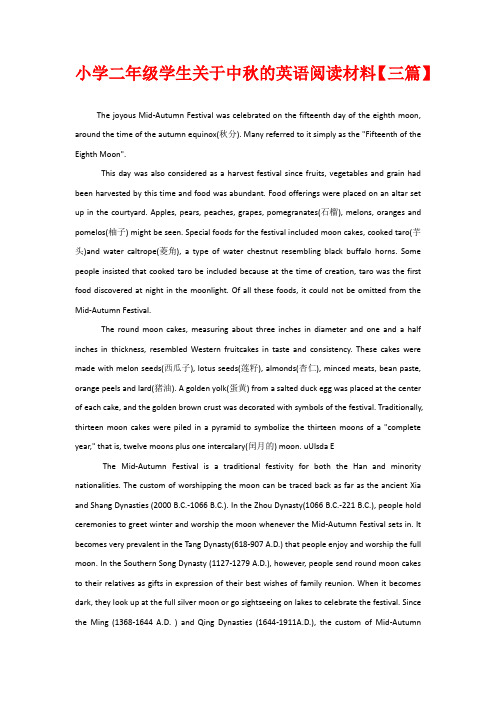
小学二年级学生关于中秋的英语阅读材料【三篇】The joyous Mid-Autumn Festival was celebrated on the fifteenth day of the eighth moon, around the time of the autumn equinox(秋分). Many referred to it simply as the "Fifteenth of the Eighth Moon".This day was also considered as a harvest festival since fruits, vegetables and grain had been harvested by this time and food was abundant. Food offerings were placed on an altar setup in the courtyard. Apples, pears, peaches, grapes, pomegranates(石榴), melons, oranges and pomelos(柚子) might be seen. Special foods for the festival included moon cakes, cooked taro(芋头)and water caltrope(菱角), a type of water chestnut resembling black buffalo horns. Some people insisted that cooked taro be included because at the time of creation, taro was the first food discovered at night in the moonlight. Of all these foods, it could not be omitted from the Mid-Autumn Festival.The round moon cakes, measuring about three inches in diameter and one and a half inches in thickness, resembled Western fruitcakes in taste and consistency. These cakes were made with melon seeds(西瓜子), lotus seeds(莲籽), almonds(杏仁), minced meats, bean paste, orange peels and lard(猪油). A golden yolk(蛋黄) from a salted duck egg was placed at the centerof each cake, and the golden brown crust was decorated with symbols of the festival. Traditionally, thirteen moon cakes were piled in a pyramid to symbolize the thirteen moons of a "complete year," that is, twelve moons plus one intercalary(闰月的) moon. uUlsda EThe Mid-Autumn Festival is a traditional festivity for both the Han and minority nationalities. The custom of worshipping the moon can be traced back as far as the ancient Xia and Shang Dynasties (2000 B.C.-1066 B.C.). In the Zhou Dynasty(1066 B.C.-221 B.C.), people hold ceremonies to greet winter and worship the moon whenever the Mid-Autumn Festival sets in. It becomes very prevalent in the Tang Dynasty(618-907 A.D.) that people enjoy and worship the full moon. In the Southern Song Dynasty (1127-1279 A.D.), however, people send round moon cakesto their relatives as gifts in expression of their best wishes of family reunion. When it becomes dark, they look up at the full silver moon or go sightseeing on lakes to celebrate the festival. Since the Ming (1368-1644 A.D. ) and Qing Dynasties (1644-1911A.D.), the custom of Mid-AutumnFestival celebration becomes unprecedented popular. Together with the celebration there appear some special customs in different parts of the country, such as burning incense(熏香), planting Mid-Autumn trees, lighting lanterns on towers and fire dragon dances. However, the custom of playing under the moon is not so popular as it used to be nowadays, but it is not less popular to enjoy the bright silver moon. Whenever the festival sets in, people will look up at the full silver moon, drinking wine to celebrate their happy life or thinking of their relatives and friends far from home, and extending all of their best wishes to them.There is this story about the moon-cake. during the Yuan dynasty (A.D. 1280-1368) China was ruled by the Mongolian people. Leaders from the preceding Sung dynasty (A.D. 960-1280) were unhappy at submitting to the foreign rule, and set how to coordinate the rebellion without being discovered. The leaders of the rebellion, knowing that the Moon Festival was drawing near, ordered the making of special cakes. Backed into each moon cake was a message with the outline of the attack. On the night of the Moon Festival, the rebels successfully attached and overthrew the government. Today, moon cakes are eaten to commemorate this legend and was called the Moon Cake.For generations, moon cakes have been made with sweet fillings of nuts, mashed red beans, lotus-seed paste or Chinese dates(枣子), wrapped in a pastry. Sometimes a cooked egg yolk can be found in the middle of the rich tasting dessert. People compare moon cakes to the plum pudding and fruit cakes which are served in the English holiday seasons.【篇二】中秋节的传说Hou Yi (后羿) was a great archer(射手) and architect(建筑家), who shot down nine extra(多余的) suns thathad suddenly appeared in the sky and thus(因此) kept the earth from being scorched(烤焦). He also built a palace of jade(翡翠) for the Goddess of the Western Heaven(西王母). For this, he was rewarded with a pill containing the elixir(长生不老药) of immortality(不朽), but with strings attached--he must fast(斋戒) and pray for a year before taking it. His wife, Chang E (嫦娥), whose beauty was surpassed(超过) only by her curiosity, discovered and swallowed(吞)the pill and in no time soared(高飞) to the moon and became a permanent(永久) resident(居民) there. Upon reaching the moon, Chang E, in dismay(沮丧), coughed up the pill, which turned into a jade rabbit that, day and night, pounds out a celestial(天上的) elixir for the immortals.Another permanent lunar resident of Chinese origin(出身) is Wu Kang (吴刚), a shiftless(偷懒的) fellow who changed apprenticeships(学徒年限) all the time before disappointing(使失望) his last master, who was an immortal. From him Wu learned to be immortal himself, but he was punished(惩罚) by being required to chop(砍) down a cassia(肉桂) tree in the moon, an impossible mission. The cut in the tree heals(痊愈) completely the same day, so Wu Kang is still chopping away for eternity(永远). Some Chinese crave(渴求) to drink his cassia blossom wine(桂花酒).The Chinese believe that the moon is at its largest and brightest, and Chang E at her most beautiful, on the 15th night of the eighth lunar(阴历) month. They are at least half-right, for at that time most of China is in the dry season and the moon looms brightest. It‘s also cool then, a perfect time to celebrate the harvest which has just concluded; hence(因此), the Mid-Autumn Festival is also called the Harvest Festival. The festival is a time for family reunions(团聚) to appreciate the moon (赏月) and eat moon cakes together. Bathed in bright moonshine and with the company(陪伴) of chrysanthemum(菊花) and cassia blossoms, poets(诗人) eat crab meat(蟹肉) and moon cake, drink tea and wine, and versify the night away.【篇三】中秋节庆祝方式Celebration wayMidautumn Festival in Singapore is quite lively. The holiday arrived a front for month, the moon cake lantern starts to go on the market. Moon cake, not only satisfies people‘s luck of having good things to eat also to use for the ancestor worship to pay respects to the moon, is the holiday high quality goods which the relative friend presents mutually. Except the moon cake, Midautumn Festival‘s another kind of holiday high quality goods are "the pomelo".Speaking of the young people, makes them feel the interest is the all kinds ofmanufacture fine lantern, they also were taking advantage of the holiday opportunity, exposes manufactures the lantern the talent, adults also may at the once a year lantern manufacture competition and the decorative lantern exposition heartily the entertainment.The Singaporean person also may participate by the populace contacts or the clubhouse sponsor midautumn festival party. The whole family enjoys looking at the moon also is fine deeds together, displays the fruits and melons, the moon cake in the home, again adds the children lantern, is warm, harmonious 中秋夜.In order to cause the midautumn festival festival the atmosphere thickly, celebration is more common, we suggested hangs up the lantern in the public place, at the same time sponsors plays lantern-riddles and so on the activity.。
六则二年级英语阅读材料及中文翻译
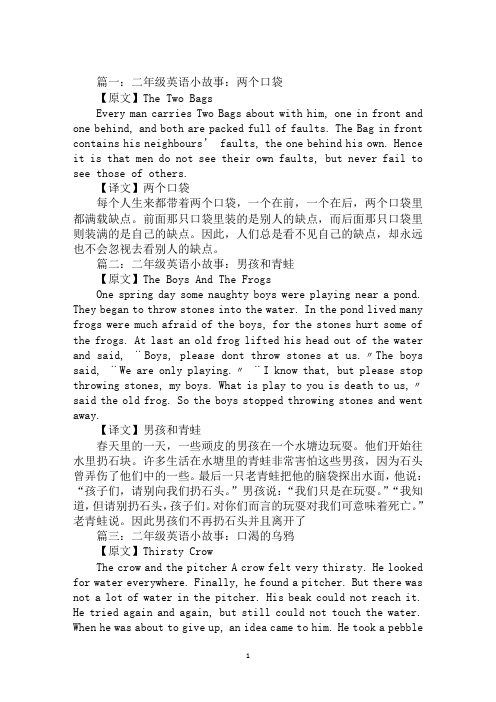
篇一:二年级英语小故事:两个口袋【原文】The Two BagsEvery man carries Two Bags about with him, one in front and one behind, and both are packed full of faults. The Bag in front contains his neighbours’ faults, the one behind his own. Hence it is that men do not see their own faults, but never fail to see those of others.【译文】两个口袋每个人生来都带着两个口袋,一个在前,一个在后,两个口袋里都满载缺点。
前面那只口袋里装的是别人的缺点,而后面那只口袋里则装满的是自己的缺点。
因此,人们总是看不见自己的缺点,却永远也不会忽视去看别人的缺点。
篇二:二年级英语小故事:男孩和青蛙【原文】The Boys And The FrogsOne spring day some naughty boys were playing near a pond. They began to throw stones into the water. In the pond lived many frogs were much afraid of the boys, for the stones hurt some of the frogs. At last an old frog lifted his head out of the water and said, ¨Boys, please dont throw stones at us.〃The boys said, ¨We are only playing.〃¨I know that, but please stop throwing stones, my boys. What is play to you is death to us,〃said the old frog. So the boys stopped throwing stones and went away.【译文】男孩和青蛙春天里的一天,一些顽皮的男孩在一个水塘边玩耍。
小学二年级英语阅读理解【五篇】
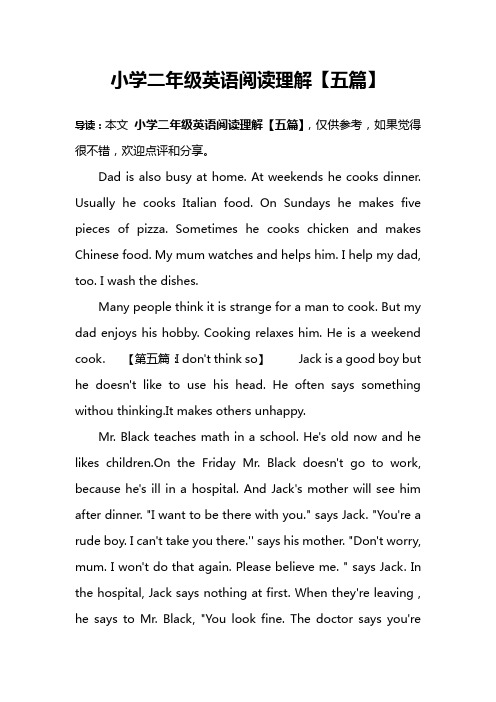
小学二年级英语阅读理解【五篇】导读:本文小学二年级英语阅读理解【五篇】,仅供参考,如果觉得很不错,欢迎点评和分享。
Dad is also busy at home. At weekends he cooks dinner. Usually he cooks Italian food. On Sundays he makes five pieces of pizza. Sometimes he cooks chicken and makes Chinese food. My mum watches and helps him. I help my dad, too. I wash the dishes.Many people think it is strange for a man to cook. But my dad enjoys his hobby. Cooking relaxes him. He is a weekend cook. 【第五篇:I don't think so】Jack is a good boy but he doesn't like to use his head. He often says something withou thinking.It makes others unhappy.Mr. Black teaches math in a school. He's old now and he likes children.On the Friday Mr. Black doesn't go to work, because he's ill in a hospital. And Jack's mother will see him after dinner. "I want to be there with you." says Jack. "You're a rude boy. I can't take you there.'' says his mother. "Don't worry, mum. I won't do that again. Please believe me. " says Jack. In the hospital, Jack says nothing at first. When they're leaving , he says to Mr. Black, "You look fine. The doctor says you'regoing to die, but I don't think so. "。
英语文章阅读理解二年级
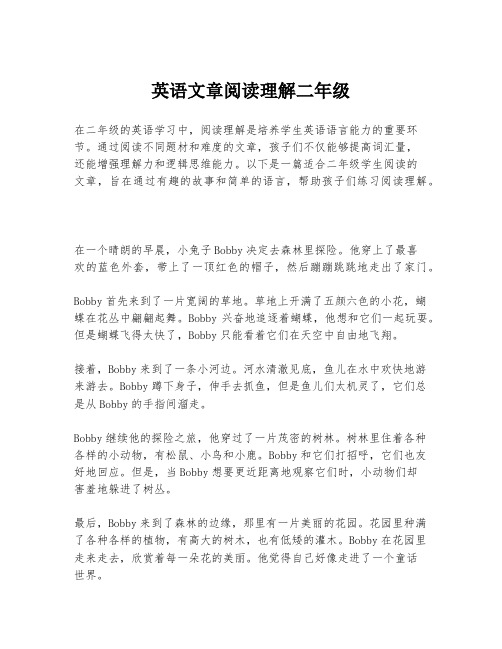
英语文章阅读理解二年级在二年级的英语学习中,阅读理解是培养学生英语语言能力的重要环节。
通过阅读不同题材和难度的文章,孩子们不仅能够提高词汇量,还能增强理解力和逻辑思维能力。
以下是一篇适合二年级学生阅读的文章,旨在通过有趣的故事和简单的语言,帮助孩子们练习阅读理解。
在一个晴朗的早晨,小兔子Bobby决定去森林里探险。
他穿上了最喜欢的蓝色外套,带上了一顶红色的帽子,然后蹦蹦跳跳地走出了家门。
Bobby首先来到了一片宽阔的草地。
草地上开满了五颜六色的小花,蝴蝶在花丛中翩翩起舞。
Bobby兴奋地追逐着蝴蝶,他想和它们一起玩耍。
但是蝴蝶飞得太快了,Bobby只能看着它们在天空中自由地飞翔。
接着,Bobby来到了一条小河边。
河水清澈见底,鱼儿在水中欢快地游来游去。
Bobby蹲下身子,伸手去抓鱼,但是鱼儿们太机灵了,它们总是从Bobby的手指间溜走。
Bobby继续他的探险之旅,他穿过了一片茂密的树林。
树林里住着各种各样的小动物,有松鼠、小鸟和小鹿。
Bobby和它们打招呼,它们也友好地回应。
但是,当Bobby想要更近距离地观察它们时,小动物们却害羞地躲进了树丛。
最后,Bobby来到了森林的边缘,那里有一片美丽的花园。
花园里种满了各种各样的植物,有高大的树木,也有低矮的灌木。
Bobby在花园里走来走去,欣赏着每一朵花的美丽。
他觉得自己好像走进了一个童话世界。
太阳开始下山了,Bobby知道是时候回家了。
他依依不舍地离开了森林,但是他的心里充满了快乐和满足。
因为他知道,明天他还可以再来探险,发现更多森林里的秘密。
这篇文章通过描述小兔子Bobby的森林探险,向孩子们展示了一个充满想象和探索的世界。
文章中的语言简单易懂,适合二年级学生阅读。
通过阅读,孩子们可以学习到新词汇,如“探险”、“蝴蝶”、“清澈”等,同时也能够理解故事情节,培养他们的阅读兴趣和理解能力。
(完整word版)适合二年级小学生的英语阅读理解【三篇】

适合二年级小学生的英语阅读理解【三篇】导读:本文适合二年级小学生的英语阅读理解【三篇】,仅供参考,如果觉得很不错,欢迎点评和分享。
【篇一】Mum: Bill.Bill: Yes, mum.Mum: Are you reading in the bedroom?Bill: No, I am not. Mum: What are you doing?Bill: To tell you the truth, I am playing a computer game.Mum: What game is it? Bill: Driving Car.Mum: Is it very interesting?Bill: Yes, it is. Oh, my car is broken. (坏了).Mum: Well, I think you should do some reading.根据短文,判断下列内容是否符合短文内容,如符合写T,否则写F。
( ) 1. Bill is reading in the classroom.( ) 2. The computer game is very interesting.( ) 3. Bill’s mother is talking with him.( ) 4. Bill’s mother likes playing computer games.( ) 5. Bill’s mother thinks Mike should play comp uter game.答案1-5 FTTFF 【篇二】Julia is a girl. She is eleven. She looks a little fat. She likes ice-cream very much. She almost has two ice cream every day! She also likes hamburgers and chips. She goes to McDonald’s to have ice cream, hamburgers and chips every Saturday afternoon. Her cousins Ben doesn’t like ice-cream, but he likes McDonald’s too. Ben goes to McDonald’s with Julia very Saturday afternoon.( ) 1. How old is Julia?A. 10.B. 11.C. 12.( ) 2. Who likes ice cream very much?A. Julia.B. Ben.C. Julia and Ben.( ) 3. When does Julia go to McDonald’s?A. Every Sunday morning.B. Every Sunday afternoon.C. Every Saturday afternoon.( ) 4. Does Ben like McDonal’s?A. Yes, he does.B. No, he doesn’t .C. No, he does.( ) 5. Who goes to McDonal’s with Julia?A. Her parents.B. Her friends.C. Her cousin.答案1-5 BACBC 【篇三】根据短文,判断下列内容是否符合短文内容,如符合写T,否则写F。
